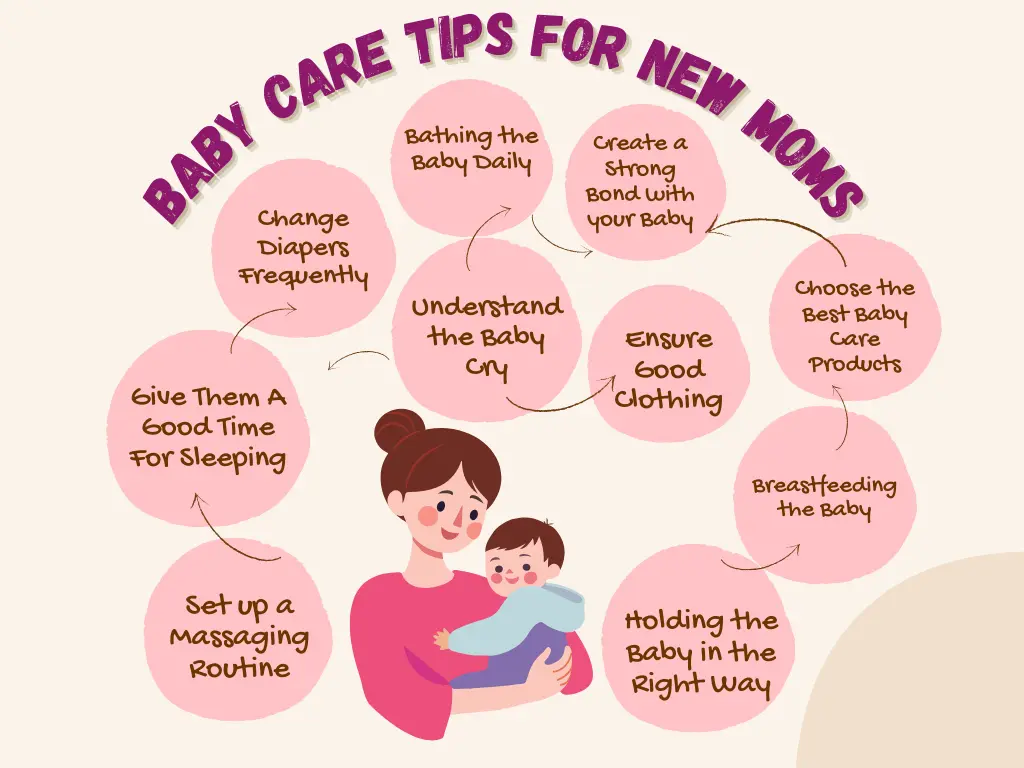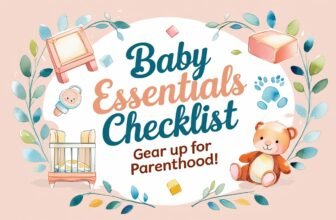
Baby care is essential for every new parent. It involves understanding your baby’s needs and providing the right support.
Caring for an infant can feel overwhelming at first. With so many products and advice available, it’s hard to know where to start. This guide will help you navigate the world of baby care with ease. You will learn about feeding, bathing, and comforting your baby.
You will also discover tips for creating a safe and nurturing environment. Understanding your baby’s cues will make a big difference in your experience. Each stage of your baby’s growth brings new challenges and joys. By focusing on baby care, you’ll build a strong bond that lasts a lifetime.
Essentials For Newborn Care
Newborn care is important for your baby's health. It involves many tasks. Each task supports your baby's growth. Knowing the essentials helps new parents feel confident. Let's explore two key areas of newborn care.
Creating A Safe Sleep Environment
Your baby needs a safe place to sleep. A firm mattress is essential. Avoid soft bedding like pillows and blankets. These items can increase the risk of suffocation.
Always place your baby on their back to sleep. This position reduces the risk of Sudden Infant Death Syndrome (SIDS). Keep the crib or bassinet free of toys. A clear space ensures your baby's safety.
Maintain a comfortable room temperature. Too hot or too cold can disturb sleep. Dress your baby in light clothing. This helps them stay comfortable.
Diapering Basics
Diapering is a key part of newborn care. Choose the right size diaper for your baby. A snug fit prevents leaks and keeps your baby dry.
Change diapers frequently to avoid rashes. Clean your baby's bottom with wipes or a damp cloth. Pat dry gently before putting on a new diaper.
Dispose of used diapers properly. Use a diaper pail to contain odors. Wash your hands after each change to stay hygienic.
Feeding Your Newborn
Feeding your newborn is a vital part of baby care. Choose breast milk or formula to meet their needs. Pay attention to their hunger cues and create a calm feeding routine. This helps your baby feel secure and grow healthy.
Feeding your newborn is one of the most crucial aspects of their early life. It’s about meeting their nutritional needs while also building a bond. Whether you choose breastfeeding or bottle-feeding, knowing the right techniques can make this experience more enjoyable for both you and your baby.
Breastfeeding Techniques
Breastfeeding can be a beautiful bonding experience. Start by finding a comfortable position. You can try the cradle hold, cross-cradle, or side-lying position. Each baby is different, so you might need to experiment to see what works best for both of you. Make sure your baby latches properly. A good latch helps prevent sore nipples and ensures your baby gets enough milk. Your baby’s mouth should cover not just the nipple but also part of the areola. Look for signs that your baby is feeding well. Swallowing sounds, relaxed hands, and contented facial expressions indicate they are getting enough milk. If they seem fussy or are not gaining weight, consult a healthcare professional.
Bottle-feeding Tips
If you opt for bottle-feeding, choose a bottle and nipple that suits your baby’s age and feeding style. Some babies prefer a slow-flow nipple, while others may like a medium or fast flow. Hold your baby in a semi-upright position. This helps prevent ear infections and ensures they are comfortable. Always keep the bottle at an angle to prevent air from getting into the nipple. Pay attention to your baby’s cues. They may turn their head away when they’re full or may suck vigorously when hungry. Allow breaks during feeding to mimic breastfeeding and let your baby breathe and swallow comfortably. Are you prepared for the challenges of feeding? Every baby is unique, and what works for one may not work for another. Stay patient, be flexible, and remember that the goal is to foster a loving environment.
Bathing And Hygiene
Bathing and hygiene are essential parts of baby care. Keeping your baby clean helps prevent skin infections. A gentle bathing routine creates a calming experience for both you and your baby. Understanding how to care for your baby's hygiene is important for their health and comfort.
Gentle Bathing Routines
Choose a time when your baby is calm. Avoid bath time during fussiness. Prepare all supplies before starting. You will need a soft washcloth, baby soap, and a towel.
Fill the tub with a few inches of warm water. Test the water temperature with your wrist. Lower your baby into the tub slowly. Support their head and neck for safety.
Use a gentle washcloth to clean your baby. Start with their face, using plain water. Then wash the rest of their body, focusing on folds and creases. Rinse thoroughly to remove any soap.
After the bath, wrap your baby in a warm towel. Pat them dry gently. Apply a gentle moisturizer if needed. Keep your baby's skin soft and hydrated.
Umbilical Cord Care
Caring for the umbilical cord is important. Keep it clean and dry. Clean the area gently with a damp cloth. Avoid using alcohol or other harsh chemicals.
Let the cord fall off naturally. This can take one to three weeks. Keep an eye out for signs of infection. Redness, swelling, or a foul smell are warning signs.
Dress your baby in loose clothing. This helps the area to breathe. Avoid tight diapers that cover the cord stump. Proper care ensures a healthy healing process.
Dressing Your Newborn
Dressing your newborn is an important task. It affects their comfort and well-being. Choosing the right clothes can make a big difference. Newborns have sensitive skin. Soft and gentle fabrics are best.
Dress your baby in comfortable clothes. Keep them warm and cozy. Remember, less is often more. Simple outfits make dressing easier.
Choosing Comfortable Clothing
Comfort is key in baby clothing. Look for soft materials like cotton. Cotton is breathable and gentle on the skin. Avoid scratchy tags or seams. These can irritate your baby.
Opt for stretchy fabrics. They allow for easy movement. Choose outfits that are easy to put on and take off. Snap buttons or zippers work well.
Consider the weather. Light clothes are great for warm days. Warm layers are needed for colder days. Always prioritize your baby's comfort.
Understanding Layering
Layering helps keep your baby at the right temperature. Start with a basic onesie. Add layers as needed. A lightweight blanket can also help.
Check the room temperature. Adjust your baby's clothing based on this. If it’s hot, dress them in one layer. If it’s cold, add more layers.
Always feel your baby's neck or back. This helps you know if they are too hot or too cold. Aim for comfort. Happy babies are often more relaxed and easier to care for.
Healthcare For Newborns
Taking care of a newborn is a big responsibility. Parents must focus on health. This includes regular check-ups and vaccinations. Understanding common health issues is also vital. Early care can prevent serious problems later on. Here’s what to know about newborn healthcare.
Immunization Schedule
Vaccinations protect babies from serious diseases. The first vaccines usually start at birth. Common vaccines include Hepatitis B and DTaP. These protect against hepatitis and diphtheria.
At 2 months, more vaccines are given. These include IPV, Hib, and PCV. Parents should keep track of these dates. A pediatrician can help with this schedule. Regular check-ups ensure that your baby stays on track.
Common Health Concerns
Newborns can face various health issues. Jaundice is one common problem. It causes yellowing of the skin. Most cases are mild and resolve quickly.
Another concern is colic. This leads to excessive crying. It can be hard for parents to manage. Feeding problems are also common. Some babies struggle with breastfeeding or formula.
Watch for signs of fever or rash. These could indicate an infection. Always consult a doctor if worried. Early action can keep your baby healthy.

Credit: kidswayclinic.com
Bonding With Your Baby
Bonding with your baby is a special time. This connection helps both of you feel safe and loved. Strong bonds lead to happy and healthy development. The right activities can deepen this bond. Let’s explore some effective ways to connect.
Skin-to-skin Contact
Skin-to-skin contact is very important. Holding your baby close helps them feel secure. This contact releases hormones that promote bonding. It also helps with breastfeeding. Babies who experience skin-to-skin contact often cry less. They feel calmer and more relaxed. This closeness builds trust between you and your baby.
Reading And Singing
Reading and singing to your baby is fun. Choose simple books with bright pictures. The sound of your voice comforts them. This interaction builds a strong emotional connection. Singing lullabies can soothe your baby to sleep. Reading together enhances language skills too. These moments create lasting memories and deepen your bond.
Soothing Your Newborn
Soothing a newborn can feel challenging. Babies cry to express needs. They may be hungry, tired, or uncomfortable. Understanding how to calm them is essential for new parents. Simple techniques can help create a peaceful environment.
Swaddling Techniques
Swaddling is a popular method to soothe newborns. It mimics the snug feeling of the womb. Use a soft, breathable blanket for comfort. Lay the blanket flat and fold one corner down.
Place your baby on their back in the center. Tuck their arms close to their body. Wrap one side of the blanket around the baby. Secure it snugly but not too tight. Leave enough room for their legs to move.
Wrap the other side and tuck it under. Ensure the baby's hips can move freely. Swaddling can help reduce startle reflex. It often leads to longer sleep periods.
Understanding Newborn Cries
Every cry has a meaning. Learning to interpret these sounds is key. A hungry cry is usually rhythmic and repetitive. A tired cry may sound whiny or fussy.
Some cries indicate discomfort. Check for wet diapers or tight clothing. If your baby seems gassy, try gentle tummy rubs. Offer a pacifier for some babies who need to suck.
Responding quickly to cries builds trust. It helps your baby feel safe and secure. Over time, you will learn their unique sounds. Understanding these cues is vital for soothing.
:max_bytes(150000):strip_icc()/GettyImages-1367022758-dbc02b5baba84a5380a09dd40cbe690a.jpg)
Credit: www.parents.com
Postpartum Care For Parents
Postpartum care for parents includes essential baby care tips. Focus on feeding, bathing, and comforting your newborn. Understanding your baby's needs helps build a strong bond and ensures their well-being. Caring for your baby can be rewarding and challenging, but support is always available.
Postpartum care is essential for both parents, as it significantly influences the well-being of the family. The journey of bringing a new life into the world is beautiful, but it can also be overwhelming. Understanding how to take care of yourself after childbirth can make a big difference in your overall experience.
Physical Recovery
Your body undergoes immense changes during pregnancy and childbirth. It's crucial to focus on your physical recovery in the weeks following delivery. Start by allowing yourself time to heal. Rest as much as possible and listen to your body. Here are some tips to aid your recovery: – Stay hydrated: Drink plenty of water to help your body recover and maintain energy levels. – Eat nutritious meals: Prioritize a balanced diet rich in fruits, vegetables, and whole grains. This will support your healing and boost your energy. – Gentle movement: Once your doctor gives the green light, try light exercises like walking. It helps improve circulation and lifts your mood. Are you aware that simple self-care routines can significantly speed up your recovery?
Emotional Well-being
The emotional rollercoaster after childbirth can be intense. It's common to experience a range of feelings, from joy to anxiety. Connecting with others can help. Reach out to friends, family, or support groups to share your experiences. Consider these strategies for emotional wellness: – Talk about your feelings: Open up about what you’re going through. Sharing your thoughts can help lighten the emotional load. – Practice mindfulness: Techniques like deep breathing or meditation can reduce stress and improve your mood. – Seek professional help if needed: Don’t hesitate to talk to a therapist if you feel overwhelmed. Have you taken a moment to check in with your feelings today? Your emotional health matters just as much as your physical recovery. Caring for yourself is not selfish—it's essential for your family. Embrace this phase with intention and compassion for yourself.

Credit: www.amazon.com
Frequently Asked Questions
What Is The Basic Care For The Baby?
Basic care for a baby includes feeding, changing diapers, bathing, and ensuring safe sleep. Regular pediatric check-ups are essential for monitoring growth and development. Provide love and interaction to promote bonding. Keep the baby's environment clean and free from hazards for their safety and well-being.
How Old Should A Baby Go To Daycare?
Babies can start daycare around 6 to 12 months old. This age allows for social interaction and developmental growth. Parents should consider their child's readiness and the daycare environment before making a decision. Every child is different, so evaluate individual needs and circumstances.
What Are The 5 S's Of Newborn Care?
The 5 S's of newborn care are Swaddling, Side or stomach position, Shushing sounds, Swinging gently, and Sucking. These techniques help soothe and calm babies, promoting better sleep and comfort. Implementing them can enhance your newborn's well-being and support bonding during the early weeks.
What Is The Hardest Month With A Baby?
The hardest month with a baby often varies for each family. Many parents find the first three months challenging due to sleep deprivation and adjustment. Babies may also experience growth spurts and colic during this time, adding to the stress.
Individual experiences will ultimately shape what feels hardest.
Conclusion
Caring for your baby is a big responsibility. It involves love, attention, and patience. Remember to follow safe practices for feeding, sleeping, and playing. Each baby is unique and has different needs. Trust your instincts as a parent. Seek help when you feel unsure.
Connecting with other parents can provide support and advice. Enjoy this special time with your little one. Every moment matters. Your care shapes their future. Stay informed and keep learning. You are doing great!







